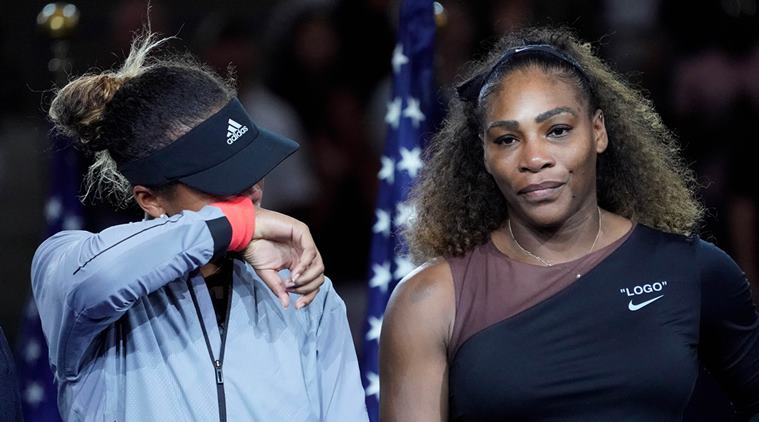Fallibility of a champion
At the US Open, Serena Williams was on the wrong side of the rules.

Naomi Osaka in tears during the trophy ceremony of the US Open. (Source: USA Today Sports)
Let’s get the facts out of the way first. During Saturday night’s US Open final defeat to Naomi Osaka, Serena Williams received signals from her coach, smashed her racquet and called the chair umpire a “liar” and a “thief”. All three are punishable code violations.
By convention, good umpires and referees don’t bring notice to themselves. Chair umpire Carlos Ramos failed that benchmark spectacularly. But the argument that he should have let the incidents slide because it was a narratives-laden Grand Slam final is like saying a referee officiating a World Cup final should keep the cards in his pocket on the first couple of bone-crunching tackles.
Sitting in the hot seat, Ramos saw Williams’ coach Patrick Mouratoglou, motion her from the player’s box to move to the net. While Williams called the gesture a “thumbs up”, Mouratoglou admitted that he was “100 per cent coaching” but justified it by saying that all coaches do that. The whataboutery was propagated by Williams and her supporters who blamed Ramos for essentially doing his job.
Williams took umbrage to the first coaching violation of her career, stating repeatedly that she doesn’t cheat, and demanded the umpire to relay the same to the crowd. But Ramos never said that she did. The umpire sanctioned the coach, which unfortunately reflected on the player. Williams believed that Ramos “attacked her character”, but she did the same to the official.
Ramos, a “gold-badge” official, has completed a chair umpire’s equivalent of a “Golden Slam” — officiating in the final of all four Grand Slams and the Olympics. He is also known to be a stickler for the rules. Rafael Nadal believes “he is fixated on me” due to the Spaniard’s long delays between points, Andy Murray got a code violation for saying “stupid umpire” and Novak Djokovic was issued a warning for unsportsmanlike conduct for talking with his racquet raised in the chair’s direction.
While he has also warned Williams’ sister Venus of in-game coaching in the past, there’s not enough evidence to label Ramos’ actions as “sexist”. Also, at the Flushing Meadows, Williams has threatened to shove a ball down a female line judge’s throat and has berated chair umpire Eva Asderaki for an unfavourable call, calling her “a hater” and “unattractive on the inside.”
When Williams got in Ramos’ face and told him, “You will never, ever, ever be on another court of mine as long as you live,” it is the greatest tennis player ever borderline-bullying an expendable official. The racial subtext is tough to pinpoint too. Williams was not playing a Russian blonde a la Maria Sharapova but a person of colour in the Haitian-Japanese Osaka.
Osaka outplayed a 23-time Grand Slam winner in the first set. She faced an in-form Williams and the partisan Arthur Ashe Stadium with Bjorn Borg-like iciness, even when a section of the crowd shrieked Williams’ name before Osaka served and cheered when she faulted. But she grew increasingly emotional with her idol losing the plot across the net, and conceded a break after saving 17 break points in a row at the tournament.
When the presentation ceremony for her first Grand Slam title began amid thunderous boos, Osaka pulled the visor down to hide her tears. She began her victory speech by apologising to the crowd, and explained it at the press conference. Williams, on her part, comforted and consoled Osaka, and asked the crowd to give due credit to the youngster. But it’s unfortunate that Osaka’s first major victory will be remembered more for a Williams meltdown.
Williams has battled conventions all her life to inspire and open the doors for the Osakas, Stephens and Keys. At 36, she continues to face prejudice. Her form-fitting compression outfit to help blood circulation at this year’s French Open prompted the authorities to introduce a dress code. And no male players are subjected to questions such as “how did motherhood influence how you comforted Naomi” at the press conference.
But on Saturday, in her WG Grace “they came to watch me bat, not you bowl” moment, she found herself on the wrong side of the rules. But champions can be wrong too. Isn’t that what makes them human?
gaurav.bhatt@expressindia.com
For all the latest Opinion News, download Indian Express App
More From Gaurav bhatt
- On-court coaching: Tennis world remains dividedAnand Amritraj says it’s difficult to police coaching so ban should be lifted, while Ankita Raina says those who don’t have resources will be at…
- Cut above the rest: Meet Vinesh Phogat, the first female Indian wrestler to win gold at Asian GamesA Cut Above the Rest: She had never wanted to be an also-ran or bask in the reflected glory of her successful older cousins. Instead,…
- Ahead of 2020 Tokyo Olympics, Amit Panghal could face a weighty issueIOC's plans of scrapping men's categories from the Tokyo Olympics programme could see boxer Amit Panghal fight out of his division...








































No hay comentarios:
Publicar un comentario